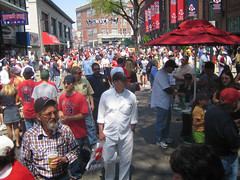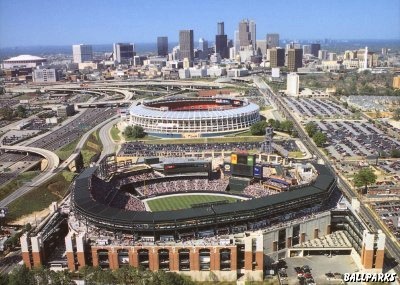Potaytoe, potahtow, tomato, tomahto and the baseball stadium
 Yawkey Way by Shawn Morrison. His caption: They close off Yawkey Way before games now. It's like a carnival, bands playing all sorts of food and every variation on Red Sox clothing you could possibly imagine.
Yawkey Way by Shawn Morrison. His caption: They close off Yawkey Way before games now. It's like a carnival, bands playing all sorts of food and every variation on Red Sox clothing you could possibly imagine.I am really really tired of the baseball stadium debacle. Clearly, the Lerners will win in the end, and get the right to develop a mixed use development around the stadium and make even more money from the DC public trough. Thinking about this from a balance of payments standpoint, this is a massive transfer of wealth from DC to Montgomery County, Maryland, where most members of the Lerner Baseball Group (Washington Nationals) live.
The Examiner published a piece by Colin Peppard (of DCist) on the subject yesterday, "Time to throw out Mayor Williams’ hidden-ball trick." He writes:
Unfortunately, the mayor’s bold vision for Anacostia now looks a lot less like Main Street, USA, and a lot more like a 5-acre parking lot and towering concrete garages.
First, stadium officials called foul on plans to use environmentally friendly building methods, which would save energy and help protect the fragile Anacostia River from polluted runoff. “Too expensive,” they said, even though the city will now spend millions more to power the stadium, and already spends millions annually trying to restore the Anacostia.
That was a tough blow for those of us who thought the mayor was as committed to green buildings as he claimed to be. But it was nothing compared to the news that the mayor would not actually be able to bring the very development he had initially promised to the public in order to sell it on the stadium.
The rapidly collapsing development plans leave the city without a large block of parking spaces it is contractually obligated to provide. As a result, city officials are exploring the option of temporarily paving over a 5-acre swath of land next to the stadium, which might allow for planning negotiations to continue in the future.
The team’s new owners are vigorously lobbying against that, in favor of two massive free-standing parking garages permanently erected on the site, seriously reducing the prospect of any future development.
While either plan might satisfy the District’s legal contracts, neither will justify the contract the mayor broke with District residents, who remain stuck with the bill for the stadium. It is hard to blame the Lerner group for their indifference to the redevelopment efforts; their priority is about getting people to games, not neighborhood reinvestment. The mayor squarely shoulders the blame.
Now I disagree with Colin about this point:
It is hard to blame the Lerner group for their indifference to the redevelopment efforts; their priority is about getting people to games, not neighborhood reinvestment.
Contracts are about "mutual consideration." If you get a $600 million+ "gift" it is not unreasonable to expect that you have to give something in return, say a nice area that contributes to DC not a parking sewer. (Plus, the City agreed to far too accelerated of a time schedule for building the stadium, which is likely to sock the city with more penalties besides.)
But because self-interested people are self-interested, it's best to put such requirements in a contract, because some people and interests aren't always good about "giving back."
E.g., last week at the NoMa hearing one of the developers there testified in favor of "carrots" or incentives, but not "sticks," or requirements.

The Lerners show us how well not having requirements works.
As I said in my testimony at the NoMa hearing:
Developers want the quid, but not the pro quo.
The Lerners (and Major League Baseball) are no different. It's too bad it's our quid.
 Turner Field in a sea of parking, the stadium and site plan created by Stan Kasten for the Atlanta Braves. Mr. Kasten is the president of the Washington Nationals.
Turner Field in a sea of parking, the stadium and site plan created by Stan Kasten for the Atlanta Braves. Mr. Kasten is the president of the Washington Nationals.Index Keywords: stadiums-arenas



0 Comments:
Post a Comment
<< Home